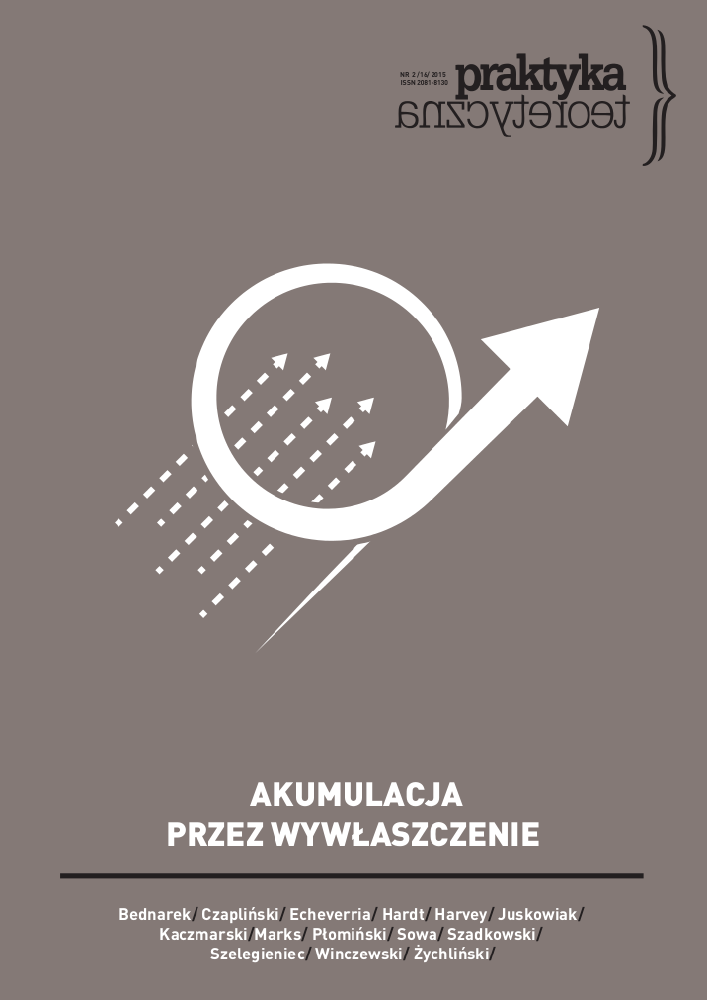Abstract
Translator’s introductionReferences
Bellofiore, Roberto i Tomasso Redolfi Riva. 2015. „The Neue Marx-Lektüre. Putting the Critique of Political Economy Back Into the Critique of Society.” Radical Philosophy 189: 24–36.
Camatte, Jacques. 1988. Capital and Community: The Results of the Immediate Process of Production and the Economic Work of Marx. Tłum. David Brown. London: Unpopular Books.
Dussel, Enrique. 2001a. „The Four Drafts Of Capital: Toward a New Interpretation of the Dialectical Thought of Marx.” Rethinking Marxism 13(1): 10–25.
Dussel, Enrique. 2001b. Towards an Unknown Marx: A Commentary on the Manuscripts of 1861–63. Tłum. Yolanda Angulo. London: Routledge.
Hardt, Michael i Antonio Negri. 2005. Imperium. Tłum. Sergiusz Ślusarski i Adam Kołbaniuk. Warszawa: W.A.B.
Heinrich, Michael. 1996–1997. „Engels’ Edition of the Third Volume of Capital and Marx’s Original Manuscript.” Science & Society 60(4): 452–466.
Marks, Karol. 1951. Kapitał. Krytyka ekonomii politycznej. Księga 1. Tłum. Paweł Hoffman, Bronisław Minc i Edward Lipiński, Warszawa: Książka i Wiedza.
Marks, Karol. 1977–1982. Zur Kritik der politischen Okonomie (Manuskript 1861–1863). W: Marx–Engels Gesamtausgabe, II, 3, t. 1–6.
Marks, Karol. 1986. Zarys krytyki ekonomii politycznej. Tłum. Jan Wyrozembski. Warszawa: Książka i Wiedza.
Marks, Karol. 2013. Kapitał 1.1. Rezultaty bezpośredniego procesu produkcji. Tłum. Mikołaj Ratajczak. Warszawa: WN PWN.
Marks, Karol i Fryderyk Engels. 1962. Werke Band 23: Das Kapital. Erster Band. Berlin: Dietz.
Negri, Antonio. 1991. Marx beyond Marx: Lessons on the Grundrisse. Tłum. Harry Cleaver, Michael Ryan i Maurizio Viano. New York: Autonomedia.
Ratajczak, Mikołaj. 2013. Posłowie tłumacza. W Karol Marks. Kapitał 1.1. Bezpośrednie rezultaty procesu produkcji. Tłum. Mikołaj Ratajczak. Warszawa: WN PWN.
Ternowski, Michaił. 1988. Preface. W Karol Marks. Karl Marx, Frederick Engels: Collected Works, Volume 30. New York: International Publishers.
License
“Theoretical Practice” seeks to put into practice the idea of open access to knowledge and broadening the domain of the commons. It serves the development of science, thinking and critical reflection. The journal is published in open-access mode under the CC-BY-NC-SA 4.0 license (detail available here: http://creativecommons.org/licenses/by-nc-sa/4.0/). Articles published in the journal may be freely distributed, stored, printed and utilized for academic and teaching purposes without restrictions.
They should not be, however, used for any commercial purposes or be reconstructed into derivative creations. Access to the journal may not be limited or offered for a fee by any third party.
Prospective authors are obliged to fill in, sign and send back the publishing contract compliant with the CC licencing. [PL.pdf, PL.doc, EN.pdf,EN.doc].
According to this contract, authors grant the journal a non-exclusive right to publish their work under the creative commons license (CC-BY-NC-SA 4.0) without any financial obligation on both sides of the contract.
Before submission authors should make sure that derivative materials they use are not protected by copyright preventing their non-commercial publication. Authors are responsible for any respective copyright violations.
